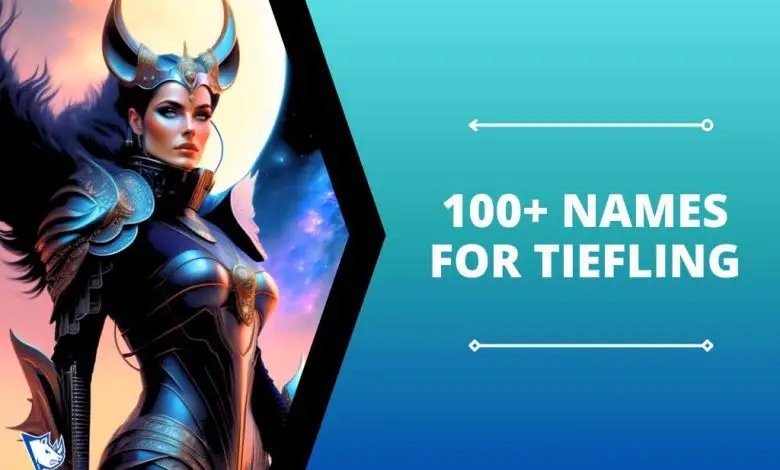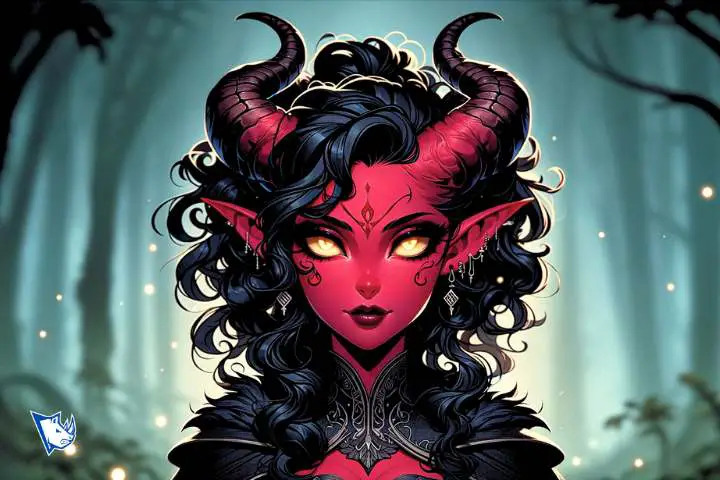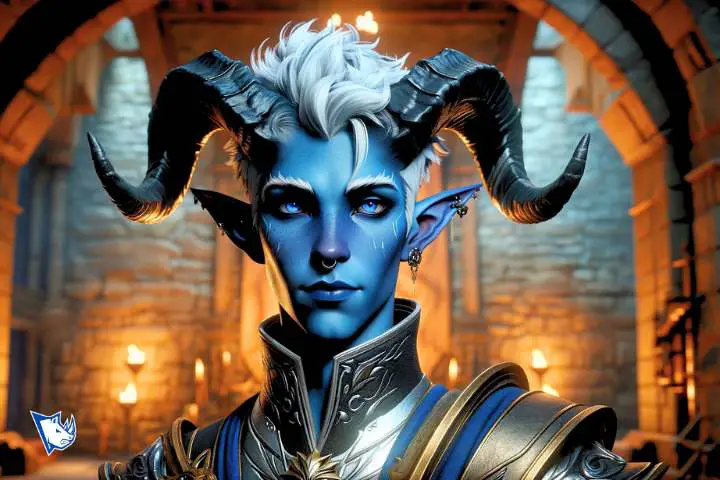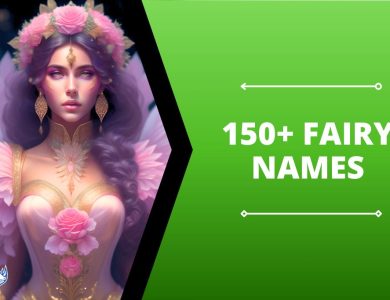100+ Best Names for Tiefling

Devilishly awesome DND fans ready to dive into the mysterious world of Tiefling names? Well, get ready to have your horns blown off, because we’re about to embark on a thrilling journey through the dark and fantastical realm of these infernal beings! Whether you’re a Dungeons & Dragons fanatic, a fantasy literature lover, or just a curious soul searching for some wickedly cool name inspiration, this blog is here to ignite your excitement and reveal the enchanting secrets behind Tiefling naming traditions.
Read Also>> Warforged Names
Female names for Tiefling
Female Tiefling names often embody a blend of mystical allure and powerful presence, reflecting the dual nature of their infernal and human lineage.

- Abyssia – Derived from “abyss,” symbolizing depth and mystery.
- Brimstone – Refers to the fire and brimstone of hell, implying intensity and ferocity.
- Crimsona – Inspired by the color crimson, suggesting passion and danger.
- Draeka – A play on “drake,” alluding to dragon-like fierceness and grace.
- Eclipsa – From “eclipse,” denoting mystery and hidden power.
- Fiammetta – Italian for “little fiery one,” indicating a fiery spirit.
- Gloomia – Suggests darkness and a brooding nature.
- Hecate – Named after the Greek goddess of magic, hinting at magical abilities.
- Inferna – From “inferno,” implying a connection to fire and the underworld.
- Jinx – Implies luck or the supernatural ability to bring fortune or misfortune.
- Kismet – Meaning fate or destiny, suggesting a tie to future events.
- Lorelei – A name of German origin, referring to a siren-like enchantress.
- Morticia – From “mortal,” implying a fascination with the macabre.
- Nyxia – Named after Nyx, the Greek goddess of night, symbolizing darkness.
- Omena – Suggests a portent or a sign of things to come.
- Pandora – From Greek mythology, symbolizing curiosity and unforeseen consequences.
- Quintessa – Implies a mystical or otherworldly essence.
- Ravena – Inspired by the raven, a bird often associated with mystery.
- Sable – Refers to a dark, almost black color, indicating mystery and depth.
- Thalassa – Greek for “sea,” suggesting depth and an enigmatic nature.
- Umbra – Latin for “shadow,” hinting at stealth and secrecy.
- Vespera – Latin for “evening,” suggesting tranquility and calmness.
- Wraithlyn – Implies ghostliness or an ethereal presence.
- Xanthe – Greek for “yellow” or “blonde,” often associated with vibrancy.
- Ysolde – A variant of “Isolde,” a name from tragic romance, suggesting passion.
- Zephyra – From “zephyr,” a gentle wind, implying grace and subtlety.
- Azurine – Evokes the color azure, symbolizing clarity and depth.
- Belladonna – Named after a toxic plant, indicating danger and beauty.
- Celestia – Suggesting heavenly or celestial qualities.
- Desdemona – From literature, symbolizing ill-fated beauty and strength.
- Elara – A name of celestial origins, hinting at cosmic power.
- Faylinn – Combines “fay” (fairy) and “linn” (pool), suggesting mystique.
- Gracelyn – Implies grace, combined with an air of sophistication.
- Havoc – Suggests chaos and a disruptive nature.
- Iridia – From “iridescent,” indicating a multi-faceted personality.
- Jezebel – A name with historical connotations of a strong, imposing woman.
- Kali – Named after the Hindu goddess, symbolizing destruction and rebirth.
- Lilith – A name with mythological roots, implying independence and strength.
- Maelstrom – Suggests turmoil and a whirlpool of emotions.
- Nocturne – Evoking the night, symbolizing mystery and the unknown.
- Ophidia – From “ophidian,” relating to snakes, suggesting cunning.
- Phantasia – Implies fantasy and a whimsical nature.
- Ravenna – A variant of Raven, symbolizing darkness and intelligence.
- Seraphina – From “seraphim,” implying an angelic or fiery nature.
- Tenebris – Latin for “darkness,” indicating a mysterious or hidden side.
- Undine – Refers to water spirits, symbolizing fluidity and adaptability.
- Veritas – Latin for “truth,” suggesting honesty and integrity.
- Whisper – Implies secrecy and a subtle influence.
- Xylia – Rooted in the forest, suggesting a connection to nature.
- Ygritte – A name suggesting resilience and determination.
- Zarina – Meaning “queen,” symbolizing leadership and power.
- Aradia – Named after a folkloric witch, indicating magic and mystery.
- Banshee – From Irish mythology, suggesting foresight and a haunting presence.
- Chimera – A mythological creature, indicating a complex or multifaceted nature.
- Daemonia – From “daemon,” suggesting a connection to the supernatural.
- Eclipse – Symbolizes overshadowing power and hidden aspects.
- Frostlyn – Combining frost with a feminine suffix, suggesting cold beauty.
- Garnet – A gemstone, indicating endurance and strength.
- Hexia – Implies a talent for spells and enchantments.
- Ivy – A plant known for its resilience and growth, symbolizing tenacity.
These names resonate with themes of magic, strength, and the enigmatic charm unique to Tiefling women.
Male names for Tiefling
Male Tiefling names capture the essence of their formidable heritage, often hinting at both the strength and the struggle inherent in their demonic ancestry.

- Astaroth – Named after a demon prince, symbolizing power and influence.
- Baalzephon – Derived from Baal, a name associated with dominance and strength.
- Carnage – Suggests destruction and chaos, a name for a fierce warrior.
- Dracul – Evokes the imagery of dragons, symbolizing fearsomeness and mystery.
- Erebus – Greek for darkness, suggesting stealth and mystery.
- Fenriz – Named after a mythical wolf, indicating a wild and untamed nature.
- Gorgon – Alluding to the mythical creature, suggesting a petrifying presence.
- Hades – Named after the Greek god of the underworld, symbolizing death and power.
- Incendio – Latin for fire, indicating a fiery spirit and a destructive nature.
- Jasper – A gemstone, symbolizing endurance and strength.
- Kain – A play on “Cain,” suggesting rebellion and strength.
- Lucius – Latin for light, a paradoxical name for a Tiefling.
- Mordred – A name from Arthurian legend, suggesting betrayal and strength.
- Nero – Roman Emperor known for his tyranny, indicating power and ruthlessness.
- Orion – A hunter in Greek mythology, symbolizing strength and skill.
- Pyro – Greek for fire, suggesting a fiery and passionate nature.
- Quintus – Latin for fifth, a strong and straightforward name.
- Ragnar – Norse for warrior or judgment, symbolizing strength and leadership.
- Samael – A name often associated with demons, indicating power and mystery.
- Talon – Refers to the claw of a bird of prey, symbolizing ferocity and precision.
- Umbra – Latin for shadow, hinting at stealth and secrecy.
- Vorak – A strong, made-up name that suggests power and might.
- Wrath – Suggests anger and power, a name for a fierce and aggressive character.
- Xerxes – A Persian king, symbolizing authority and power.
- Ymir – A giant in Norse mythology, suggesting strength and endurance.
- Zephyr – A gentle wind, a name that suggests speed and freedom.
- Azazel – A name often associated with fallen angels, suggesting mystery and power.
- Belial – A demon name, suggesting cunning and manipulation.
- Cainan – A variation of “Cain,” implying a rebellious and strong nature.
- Dante – After the Italian poet, suggesting depth and a journey through trials.
- Eldritch – Suggests something eerie and otherworldly.
- Fafnir – Named after a dragon from Norse mythology, symbolizing greed and power.
- Grimm – Suggests something severe or stern, a strong and unyielding name.
- Havok – Suggests widespread destruction, a name for a chaotic character.
- Iblis – An Islamic demon figure, indicating cunning and deception.
- Jareth – A name with an otherworldly feel, suggesting mystery and charm.
- Kazan – A name of Turkish origin, suggesting fire and untamed spirit.
- Lorcan – Irish for little fierce one, indicating a fiery and passionate character.
- Malik – Arabic for king, symbolizing authority and leadership.
- Nashor – Suggests a predator or a powerful hunter.
- Oleander – Named after a toxic plant, indicating danger and beauty.
- Pendragon – A name associated with King Arthur, symbolizing leadership and mystery.
- Quintain – A target used in jousting, a name that suggests strength and resilience.
- Raziel – A name often associated with mystery and secrets.
- Strife – Suggests conflict and turmoil, a name for a combative character.
- Tyrus – A name suggesting dominance and power.
- Uruk – Named after an ancient city, suggesting strength and history.
- Valek – A name that suggests stealth and cunning.
- Wolfram – A name that combines “wolf” with “raven,” suggesting intelligence and ferocity.
- Xanthus – Greek for golden, suggesting rarity and value.
- Yorick – A name from literature, symbolizing mortality and depth.
- Zagan – A name from demonology, suggesting cunning and transformation.
- Amon – A demon name, indicating power and hidden knowledge.
- Barakas – Suggests lightning or electricity, a name for a dynamic character.
- Caliban – A name from literature, suggesting wildness and an untamed nature.
- Dracon – Suggests a dragon-like character, symbolizing power and terror.
- Eremon – A name suggesting solitude or a lone warrior.
- Fenris – Named after a mythical wolf, indicating a wild and untamed nature.
- Grendel – A name from mythology, symbolizing strength and terror.
- Hyperion – A Titan in Greek mythology, suggesting light and power.
These names range from those that embrace their infernal roots to those that seek to carve out a new legacy.
How To Choose Tiefling Names?
Choosing a Tiefling name is an opportunity to dive deep into the rich lore and personality of this unique race. Many Tieflings are born from a blend of human and infernal bloodlines, resulting in names that reflect their dual nature. When selecting a name, consider incorporating elements from demonic languages like Abyssal or Infernal to add depth and authenticity to your character.
In addition to linguistic considerations, it’s essential to think about the cultural context surrounding your Tiefling character. By immersing yourself in the intricate tapestry of Tiefling culture and history, you can make an informed decision that not only captures your character’s essence but also resonates with fellow role-players within your gaming community.
Conclusion
In conclusion, Tiefling names are a reflection of the rich and diverse culture within their community. Whether drawing from infernal origins or embracing their own unique identity, Tiefling names carry deep significance and meaning. From Asmodeus to Zariel, each name tells a story and adds an extra layer of depth to the character. As we continue to explore the world of fantasy and role-playing games, it’s important to appreciate the thought and creativity that goes into crafting these names. So, whether you’re creating a new character or simply delving into the lore, take the time to understand and appreciate the significance of Tiefling names in all their complexity.



